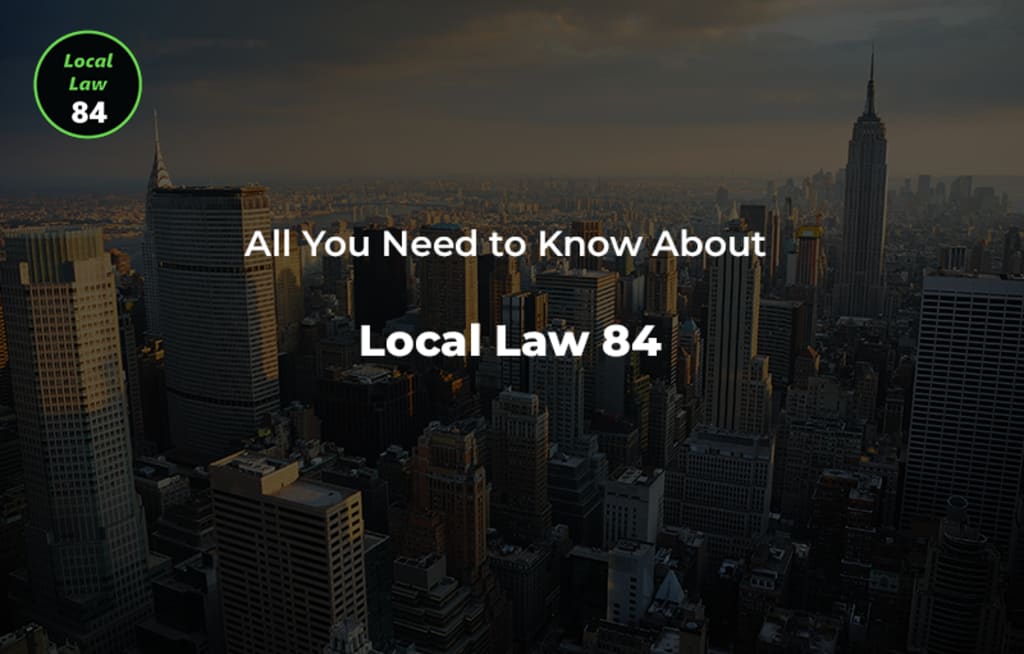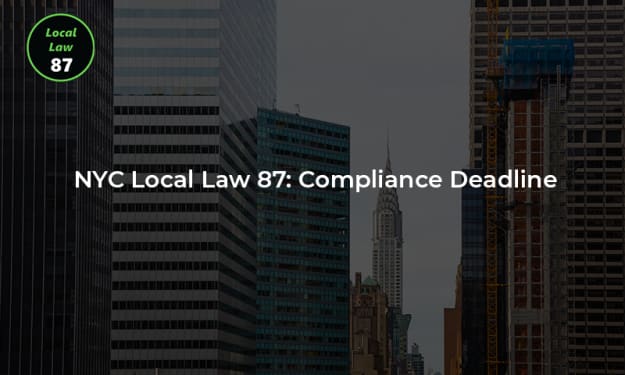All You Need to Know About Local Law 84
Local Law 84

What is the Local Law 84?
Local Law 84 (LL84) is a law enacted by the New York City Council in 2009 as part of a package of legislation aimed at reducing the city's carbon emissions and improving its energy efficiency. The law requires owners of buildings with more than 50,000 square feet of floor area, or buildings that are part of a condo or co-op that has more than 50,000 square feet of floor area, to report their annual energy and water consumption to the city.
The data collected through LL84 is used to create an energy benchmark for each building, which is a measure of how efficient the building is compared to similar buildings. The benchmark is then made public through an online database, known as the NYC Benchmarking Portal, so that building owners, tenants, and the public can see how much energy and water a building is using and how it compares to other buildings.
The goal of LL84 is to encourage building owners to invest in energy-saving measures and to help the city track progress toward its goal of reducing greenhouse gas emissions by 80% by 2050.
Purpose of the local law 84
The purpose of Local Law 84 (LL84) is to improve the energy efficiency of buildings in New York City and reduce the city's carbon emissions. By requiring building owners to report their annual energy and water consumption to the city, LL84 aims to:
1. Create transparency: By making building energy consumption data publicly available, LL84 aims to increase transparency and awareness about energy use in buildings, and encourage building owners and occupants to take action to reduce energy consumption.
2. Promote energy efficiency: LL84 is intended to encourage building owners to invest in energy-efficient upgrades, such as improved insulation, lighting, and HVAC systems, that can reduce energy consumption and lower operating costs.
3. Measure progress: The energy benchmarking data collected through LL84 provides a way to measure progress towards the city's energy efficiency and carbon reduction goals, and helps identify areas where additional action is needed.
Does Local law 84 impact me?
Whether or not Local Law 84 (LL84) impacts you depends on your relationship to a building that falls under the law's requirements. LL84 applies to buildings in New York City that have more than 50,000 square feet of gross floor area, or that are part of a condo or co-op that has more than 50,000 square feet of gross floor area.
If you are an owner or operator of a building that meets these criteria, LL84 requires you to report your building's annual energy and water consumption to the city, and to benchmark your building's energy efficiency against other similar buildings. You may also be required to make energy-efficient upgrades to your building under other laws, such as Local Law 87.
If you are a tenant or occupant of a building that falls under LL84, you may be impacted indirectly if your building owner decides to make energy-efficient upgrades that could affect your living or working conditions, such as replacing windows or upgrading HVAC systems. However, LL84 is primarily aimed at building owners and operators, rather than tenants.
If you are a member of the public, LL84 may impact you by providing access to information about building energy use and efficiency through the NYC Benchmarking Portal. This information can help you make informed decisions about which buildings to rent or occupy, and can help raise awareness about the importance of energy efficiency and reducing carbon emissions in buildings.
What are the Deadline LL84
The deadlines for Local Law 84 (LL84) reporting are based on the building's "covered" year, which is the calendar year for which energy and water consumption data must be reported. The deadlines for LL84 reporting are as follows:
- May 1: This is the deadline for submitting the previous year's energy and water consumption data for buildings that are larger than 50,000 square feet and are part of a city agency.
- May 1: This is also the deadline for submitting the previous year's energy and water consumption data for buildings larger than 100,000 square feet.
- June 1: This is the deadline for submitting the previous year's energy and water consumption data for buildings between 50,000 and 99,999 square feet.
It's important to note that LL84 reporting is required annually, and failure to comply with LL84 reporting requirements can result in fines and penalties. Building owners and managers should make sure to keep track of the deadlines and submit their LL84 reports on time to avoid any potential penalties.
What are the fines?
Building owners and managers who fail to comply with Local Law 84 (LL84) reporting requirements may be subject to fines and penalties. The exact fines and penalties can vary depending on the number of violations and the size of the building, but they can be substantial.
As of 2021, the penalties for noncompliance with LL84 reporting requirements are as follows:
- Failure to report: If a building owner or manager fails to submit an LL84 report by the deadline, they may be subject to a penalty of $500 for the first year of noncompliance, and up to $500 for each subsequent year of noncompliance.
- Inaccurate reporting: If a building owner or manager submits inaccurate information in an LL84 report, they may be subject to a penalty of $500 for the first violation, and up to $1,000 for each subsequent violation.
It's important to note that LL84 reporting is required annually, and failure to comply with reporting requirements can result in accumulating fines and penalties over time. Building owners and managers should make sure to keep track of the deadlines and submit accurate reports on time to avoid any potential penalties.
How do I comply?
To comply with Local Law 84 (LL84), building owners or managers need to take the following steps:
- Determine if your building is covered by LL84: LL84 applies to buildings in New York City that have more than 50,000 square feet of gross floor area, or that are part of a condo or co-op that has more than 50,000 square feet of gross floor area.
- Collect energy and water consumption data: You will need to collect information about your building's energy and water consumption for the previous calendar year. This information can usually be obtained from utility bills or through an automated benchmarking system.
- Enter data into the EPA's Portfolio Manager: You will need to enter your building's energy and water consumption data into the U.S. Environmental Protection Agency's Portfolio Manager tool. This tool allows you to benchmark your building's energy performance against other similar buildings.
- Submit LL84 report to the city: You will need to submit your LL84 report to the city using the NYC Benchmarking Portal. The report must include your building's energy and water consumption data, as well as other information about your building, such as its occupancy, size, and age.
- Repeat annually: LL84 reporting is required annually, so you will need to repeat these steps each year to comply with the law.
It's important to note that LL84 compliance can be complex and time-consuming, particularly for larger buildings. Building owners and managers may choose to hire a third-party consultant to assist with compliance, or to use an automated benchmarking system to streamline the reporting process.
About the Creator
The Cotocon Group
Sustainability Consulting Experts in NYC. Leading the Real Estate Industry in Reducing GHG Emissions & Increasing Property Value.
Website :- https://www.thecotocongroup.com






Comments
There are no comments for this story
Be the first to respond and start the conversation.